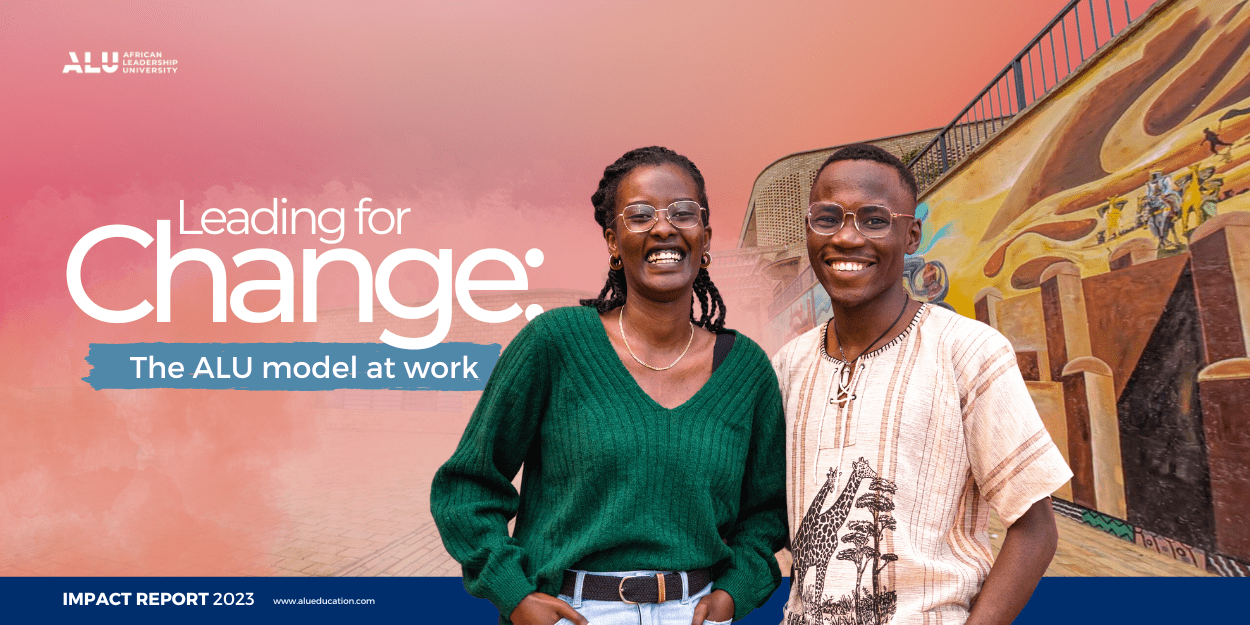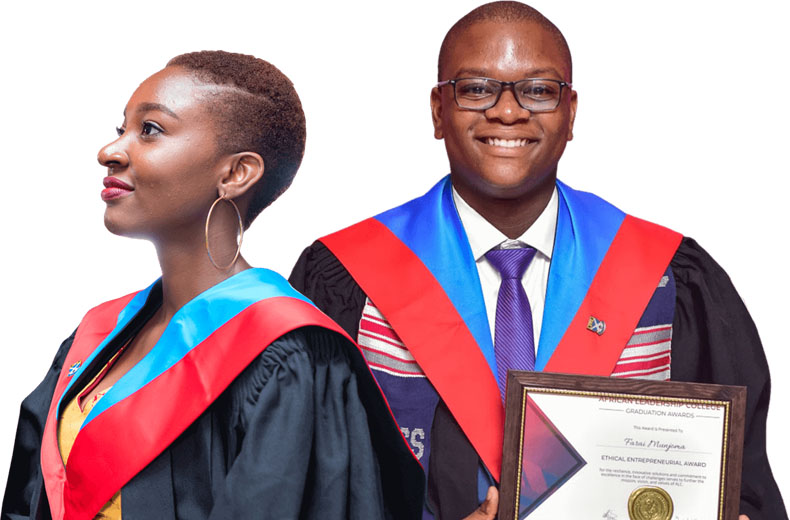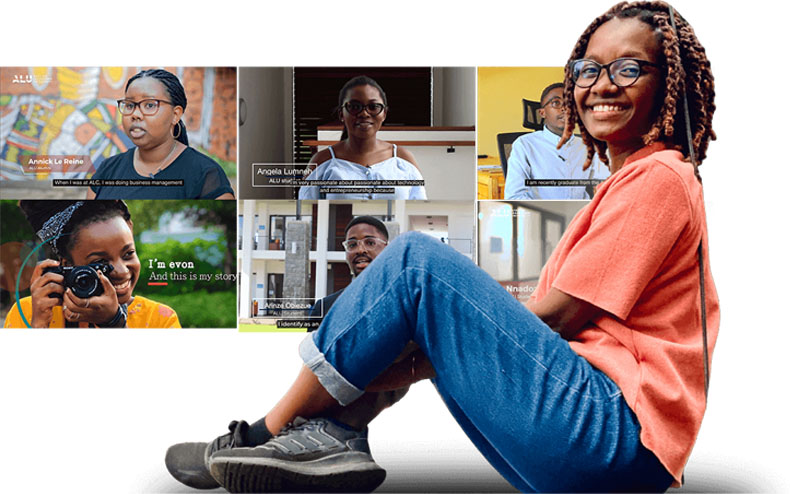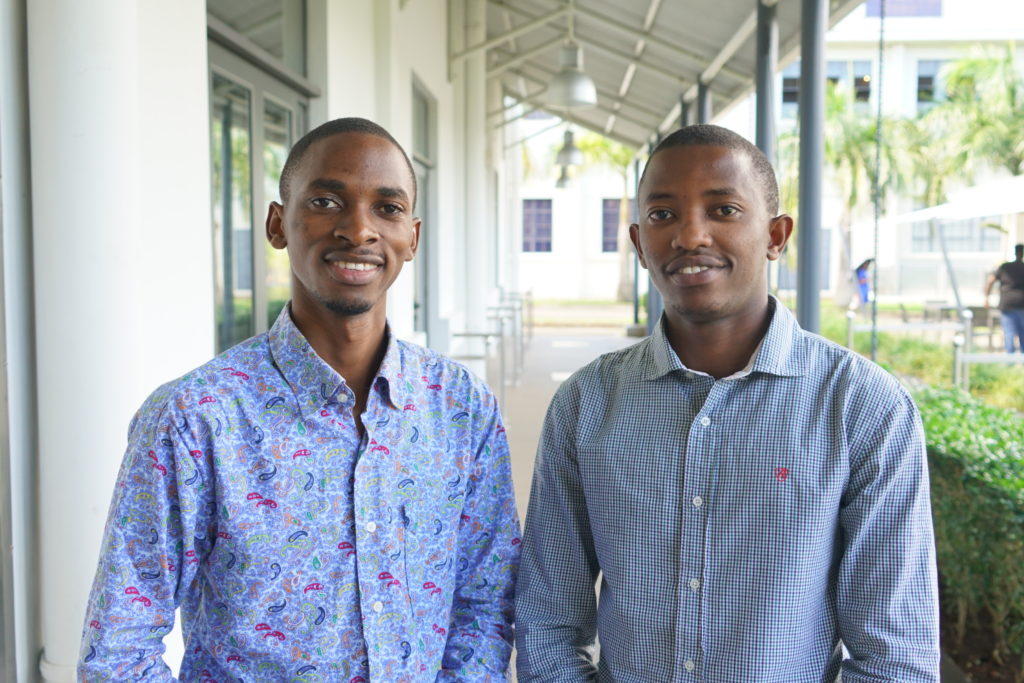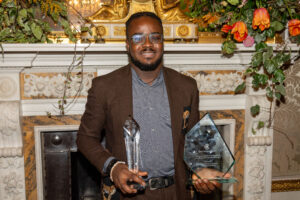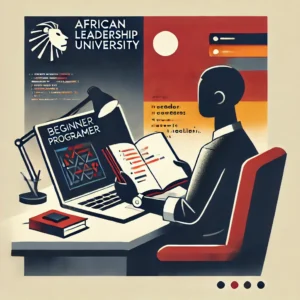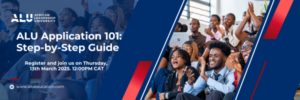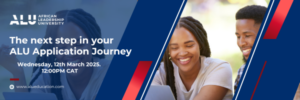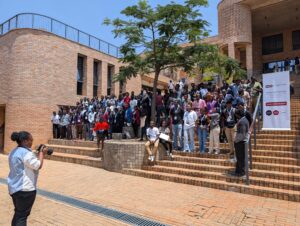Last week, Glasgow Caledonian University (GCU) recognised the entrepreneurial drive and achievement of two ALC Mauritius Students, Aloys Muhashyi and Noah Walakira, by presenting them with the Magnus Magnusson Award. In its tenth year, the award helps GCU students execute ideas and dream projects that seek to change or better their community, or the world at large. As one of the founding partners of ALU, GCU presented the two students with the prestigious award this year. The award was set up in honour of the GCU’s late Chancellor Magnus Magnusson.
We sat down with Aloys and Noah for an insightful Q&A session that delved into their individual entrepreneurial ventures, personal and professional motivators, and discussed long-term plans.
Q: Could you tell us about the moment you conceived your individual ventures?
Aloys: I can’t remember the date per say, but I started conceiving the project idea when I was about to graduate high school in 2013. A lot of my volunteer work through school inspired me to continue on in the same spirit.
Initially, I named the project Evil Fighters Family, and after deliberating, renamed it Nation Lighters to reflect the size of the project and intended impact. But it remained just that: an idea, until I started volunteering at one of the local primary schools in my home district. I watched the kids’ daily struggle and noticed how persevered in the face of adversity, focusing on their studies despite all odds.
Noah: I started Namirembe Sweater Makers when I was 16 years, and I registered it in 2012. The main inspiration for starting this company was to fight poverty by providing employment to the youth.
Q: What get you motivated and pumped to continue your work every day?
Aloys: I am motivated by people, but especially by those who are victims of circumstance and are living in unfortunate circumstances – like the children in Nation Lighters, who didn’t choose which family or nation they born into. The more time I spend with them, the more I find myself motivated.
Noah: I agree. I am motivated by the stories of the people who have gained from Namirembe Sweater Makers. I love contributing to people’s happiness.
Q: What kind of charity work or volunteering efforts were you exposed to growing up?
Aloys: The most recent charity organization that impressed me is called “Tikkun Olam”, which means “Heal the World”. This charity was an extra class I took in school that had three programmes. Briefly, in the first on, we were involved in constructing homes for homeless families – my class program managed to build three houses! The second programme focused on education and mentorship of younger school children. Finally, the third programme took us to a local health centre to help out, where we’d clean and prep medical equipment and engage with patients. This component of the programme resonated strongly with the Rwandan culture, that emphasises on sharing and empowering those in need.
Noah: I have done quite a lot of volunteer work through the Uganda Youth Forum – an organisation that was started by the First Lady to fight HIV amongst the youth population – where we participated in giving back projects to orphans, disabled and elderly through interactions with the KiBO Foundation. I have also organised community service projects from which I got the idea to expand Namirembe Sweaters Makers as a solution to provide employment for disadvantaged groups.
Q: What advice would you give to encourage your peers to create their own charity organisation or project?
Aloys: Thank you for this question. What I have seen here, even back in Rwanda, is that there is a habit of postponing plans to start their own charity organisation. What I want to tell all of them today is that no matter how unprepared you think you are, just start it. Your motivation and abilities will come once you realise you are running your own project and that your experiences can be enough.
Noah: Namirembe Sweater Makers is a for-profit organisation whose primary objective is to eradicate poverty through teaching skills and providing meaningful employment to youths. My advice to fellow peers is to consider the social good for any business they have in mind. A charity providing only social good always faces challenges of sustainability and the business focusing only on profit alienates and manipulates its people. Balancing the two is what I would advise young entrepreneurs to do.
Q: How would you define leadership?
Aloys: I define it as a combination of these words: philosophy, influence, impact and interpretation.
Noah: Leadership is serving yourself and people. It’s why I believe everyone is a leader and it’s only the levels of leadership that differ. I agree with John Maxwell that leadership is influence. And I choose to create a positive influence for my people.
Q: How do you aim to cultivate yourself as a leader?
Aloys: I believe that for any person to grow intellectually you have to absorb from others. There are a lot of people to learn from and resources to leverage off of, either at ALU, online, or by participating in conferences or competitions on or off campus. Personally, I like to keep an open mind and remain flexible when it comes to exposure and by doing so, I believe I will someday be a good leader.
Noah: I read inspirational books of or by people, who have done bigger things. I also listen to and watch videos of professionals and leaders online.
Q: How did you feel upon your receipt of the Magnus Magnusson Award this year?
Aloys: It was extremely exciting! Mostly, the award will help push my project further – and this couldn’t have happened at a better time. It will help me scale the project sooner than expected and fuel professional and personal growth.
Noah: I feel excited that my plan of expansion is going to help young people, especially young girls, in Karamoja, a disadvantaged community in Uganda. The girls in this community get married off by their parents as early as 13 years to older men in exchange for little money or few items. Namirembe Sweater Makers will focus on these young girls by teaching them skills and providing them with employment and unite them to solve the problems they face in the community.
Q: What are your long-term ambitions for your projects? How do you wish for it to develop over the next ten years?
Aloys: Oooh my goodness, I have a lot of things in mind for project, but let me try to summarize it. Looking short-term, I want to see immediate measurable impact of our work on our kids and the Rwandan community at large. Long-term, I want to develop the project’s sustainability by being able to accommodate 35 kids operating in all 30 districts of Rwanda, and also ensuring a steady and reliable flow of funds. In ten years, few kids would have graduated our programme and it would be incredible to see how their personality takes shape to address their families’ challenges. I believe there is great potential in them becoming future change-makers and key drivers or contributors in the country’s progress.
Noah: Namirembe Sweater Makers has great ambitions to eradicate poverty through skilling and providing employment to people, specifically to girls. We have achieved a great part of that dream over the past 5 years. Currently we have 25 employees and we have trained over 68 youth of which 70% are girls. In ten years, I project a team of 100 people working to produce uniforms and sweaters for over 1000 partner schools and companies.
Q: How will you be spending your summer break this year?
Aloys: I’m really looking forward to working more on this project to build a team to begin building a strong organisational culture, and keep a lookout for opportunities to raise funds to sustain the project’s future.
Noah: I plan to intern in my country, Uganda, alongside running my venture Namirembe Sweater Makers. I hope to pursue several personal development projects alongside.

